Carl E. Olson's Blog, page 254
December 21, 2011
Advent and the Apocalypse
That's the title of a talk I've given a couple of times in recent years, and it is also the title of a podcast that I recorded earlier this morning with Dr. Chris Burgwald, director of Adult Catechesis & Evangelization for the Diocese of Sioux Falls, South Dakota. We talk about the meaning of Advent and Christmas, the three comings of Christ (yes, three!), and the relationship between the season of Advent and the Eucharist.
You can access the podcast on the feed page for the Prairie Rome Companion, or go to the direct link.
Related Links on Ignatius Insight and Insight Scoop:
• On Advent and the Christmas Mystery | Archbishop Fulton Sheen
• "All of life is Advent": On the life and death of Alfred Delp, S.J. | Abtei St. Walburg
• The Mystery Made Present To Us | Fr. Alfred Delp, S.J.• Fr. Delp and Advent: "This is seed-time, not harvest." | Insight Scoop
• Eschatological Fact and Fiction: Catholicism and Dispensationalism Compared | Carl E. Olson
• The God in the Cave | G.K. Chesterton
• The Incarnation | Frank Sheed
• The Perfect Faith of the Blessed Virgin | Carl E. Olson
• Mary Immaculate | Fr. Kenneth Baker, S.J.
• Immaculate Mary, Matchless in Grace | John Saward
• The Mystery Made Present To Us | Fr. Alfred Delp, S.J.
• "Born of the Virgin Mary" | Paul Claudel
• The Old Testament and the Messianic Hope | Thomas Storck
• "Conceived by the Holy Spirit, born of the Virgin Mary" | Hans Urs von Balthasar
Benedict XVI reflects on Christmas and "the great Mystery of the Incarnation"
From Vatican Information Service:
VATICAN CITY, 21 DEC 2011 (VIS) - "The greeting on everyone's lips during this period is 'Merry Christmas! Happy Christmas Holidays!'. Let us ensure that, also in our modern societies, this exchange of good wishes does not lose its profound religious significance, and the feast does not become overshadowed by external factors", said Benedict XVI during today's general audience, his last before the Feast of the Lord's Nativity.
"With the Christmas liturgy the Church introduces us into the great Mystery of the Incarnation", the Pope told faithful gathered in the Paul VI Hall. "Christmas, in fact, is not simply the anniversary of the birth of Jesus, it is the celebration of a Mystery which has marked and continues to mark the history of man: God came to dwell amongst us, He became one of us. ... During Midnight Mass on Christmas Night we will intone these words in the responsorial Psalm: 'Today the Saviour is born for us'. ... By indicating that Jesus is born 'today', the liturgy underlines that His birth touches and permeates all of history. ... Of course, the redemption of humankind took place at a specific and identifiable moment of history: in the event of Jesus of Nazareth. But Jesus is the Son of God ... Who became flesh. Eternity entered into the confines of time and space, making it possible to meet Him 'today'. ... When, in liturgical celebrations, we hear or pronounce the phrase: 'Today the Saviour is born for us', we are not using an empty conventional expression, what we mean is that 'today', now, God is giving us the possibility to recognise and accept Him, as did the shepherds of Bethlehem, so that He can also be born into and renew our lives".
The Pope then turned his attention to another aspect, reflecting on the birth in Bethlehem in the light of the Paschal Mystery because, he said, "both Christmas and Easter are feasts of redemption. Easter celebrates redemption as a victory over sin and death. It marks the culminating moment when the glory of the Man-God shines like the light of day. Christmas celebrates redemption as the entry of God into history, when He became man in order to bring man to God. It marks, so to speak, the starting point when the first light of dawn begins to appear".
"Even the seasons of the year in which these two great feasts fall, at least in some areas of the world, can help us understand this aspect. Easter coincides with the beginning of spring when the sun triumphs over the cold and the fog and renews the face of the earth. Christmas comes at the very beginning of winter when the light and heat of the sun are unable to awaken nature, covered in a shroud of cold under which, nonetheless, life is pulsating".
"At Christmas we encounter the tenderness and love of God Who is attentive to our weakness and sin, and lowers Himself to our level. ... Let us live this Christmastime with joy. ... Above all, let us contemplate and experience this Mystery in the celebration of the Eucharist, which is the heart of Christmas. There Jesus is truly present, the true Bread descended from heaven, the true Lamb sacrificed for our salvation. I wish all of you and your families a truly Christian Christmas. May the exchange of greetings on that day be an expression of our joy in knowing that God is near us, and that He wishes to follow the journey of life with us", the Pope concluded.
The poor cannot wait
At the end of his general audience, the Holy Father delivered greetings in a number of languages to the pilgrims filling the Paul VI Hall, among them a group of primary school children from Korea and another of Australian seminarians. To Spanish speaking pilgrims he said: "I will pray to the God Child for everyone, especially those who suffer. In these holy days, may Christian charity be particularly active towards those most in need. The poor can brook no delay".
The Coming Latino Catholic Majority

The Coming Latino Catholic Majority | Jeff Ziegler | Catholic World Report
Hispanics account for more than 70 percent of the growth in the US Catholic population since 1960.
In 1558, after five years of Catholic tyranny, the good Virgin Queen succeeded Bloody Mary, who had burned countless Christians at the stake. During Elizabeth's reign, the heroic Sir Francis Drake circumnavigated the globe and defeated the Spanish Armada. After Captain John Smith established Jamestown, brave Separatists set sail for Holland to worship according to their consciences; in 1620, these men, now the Pilgrims, set sail on the Mayflower and penned the Mayflower Compact, the foundation of American representative government. They celebrated the first Thanksgiving Day, and soon Massachusetts Puritans built a shining city on a hill.
Moved by the spirit of liberty, the colonists declared their independence from King George. After winning their independence, Americans fulfilled their manifest destiny, spreading Christianity and civilization from Atlantic to Pacific. The Protestant work ethic made the United States as prosperous as it was free, while the Catholic nations to the south, marred by sloth, despotism, and corruption, were doomed to backwardness.
This version of history, influenced by the Black Legend and nativism alike and imbibed in some form by many an American, has deep roots in US history. "Surely American Protestants, freemen, have discernment enough to discover beneath them the cloven foot of this subtle foreign heresy, and will not wait for a more extensive, disastrous, and overwhelming political interference, ere they assume the attitude of watchfulness and defense," the inventor Samuel F. B. Morse wrote in his influential 1835 book Foreign Conspiracy against the Liberties of the United States.
"The Romish priests have succeeded in extinguishing reason, judgment, and common sense among the Mexicans," Charles Sparry said in his 1847 work, The Mysteries of Romanism. Describing a Mexican Marian procession, Sparry wrote that "this idol is paraded to its niche, by bishops, and by many plump, well-fed priests.… In all popish lands, the priest is everything: he is the breath in the nostrils of all devoted superstitious pagans and Romanists."
St. Peter Canisius, priest, Doctor, and "the second apostle of Germany"
On this, the feast day of St. Peter Canisius (1521-97), a re-posting of some remarks given by Pope Benedict XVI earlier this year about the Catholic Reformation-era priest and Doctor of the Church:
VATICAN CITY, 9 FEB 2011 (VIS) - Benedict XVI dedicated his catechesis during this morning's general audience to St. Peter Canisius, whom Leo XIII proclaimed as "the second apostle of Germany", and who was subsequently canonised 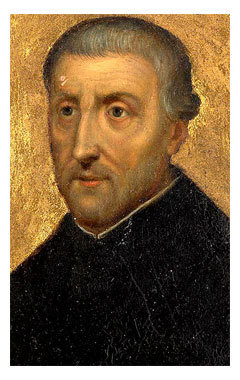 and proclaimed as a Doctor of the Church by Pius XI in 1925.
and proclaimed as a Doctor of the Church by Pius XI in 1925.
Born at Nijmegen in the Netherlands in 1521, Peter Canisius entered the Society of Jesus in 1543 and was ordained a priest in 1546. In 1548, St. Ignatius of Loyola sent him to complete his spiritual formation in Rome. A year later he moved to the Duchy of Bavaria where he became dean and rector of the University of Ingolstadt. Later he was administrator of the diocese of Vienna, Austria, where he practiced his pastoral ministry in hospitals and prisons. In the year 1566 he founded the College of Prague and, until 1569, was the first superior of the Jesuit province of upper Germany.
In this role he created a network of Jesuit communities in Germanic countries, especially schools, which became starting points for the Catholic Reformation. He participated in religious discussions with Protestant leaders, including Melanchthon, held in the city of Worms, acted as pontifical nuncio to Poland, participated in the two Diets of Augsburg in 1559 and in 1565, and attended the closing session of the Council of Trent. In 1580 he retired to Fribourg in Switzerland where he dedicated himself to writing and where he died in 1597. Peter Canisius also edited the complete works of Cyril of Alexandria and of St. Leo the Great, and the Letters of St. Jerome.
Among his most famous works were his three "Catechises", written between 1555 and 1558. The first was aimed at students capable of understanding the basic notions of theology; the second at ordinary young people for their primary religious education; and the third at children with a medium- or secondary-school education.
"One characteristic of St. Peter Canisius", said the Holy Father, was "that he was able to harmonise fidelity to dogmatic principles with the respect due to each individual. ... In a historical period of deep confessional contrasts, he avoided severity and the rhetoric of anger, something fairly rare in discussions among Christians at that time, ... and sought only to explain our spiritual roots and to revitalise faith in the Church".
"In the works destined for the spiritual education of the masses, our saint insists on the importance of the liturgy, ... the rites of Mass and the other Sacraments. However, at the same time, he is careful to show the faithful the importance and beauty of individual daily prayer to accompany and permeate participation in the Church's public worship", said Benedict XVI, pointing our that "this exhortation and this methodology maintain all their value, especially after being authoritatively re-presented by Vatican Council II".
Peter Canisius "clearly teaches that apostolic ministry is incisive and produces fruits of salvation in people's hearts only if the preacher is a personal witness of Jesus and knows how to become His instrument, closely bound to Him through faith in His Gospel and in His Church, through a morally coherent life and incessant prayer".
Here is the full text of the General Audience, on the Vatican website.
20% off Books and Films, now through December 27th
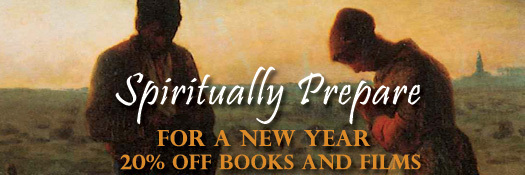
20% off Books and Films | Spiritually Prepare Yourself for a New Year!
Offer ends Tuesday December 27th, 2011 at 12:00 midnight EST.
These prices are available online only through Ignatius.com
As 2012 approaches, spiritually prepare yourself for the new year with 20% off books and films from Ignatius Press. With books from the most popular and respected spiritual director: Fr. Thomas Dubay, to others such as Abandonment to Divine Providence, Holiness is Always in Season and Five Pillars of the Spiritual Life. Spiritual guidance can be found in any of the inspirational books and films listed below.
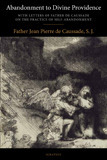 Abandonment to Divine Providence
Abandonment to Divine Providence
With Letters of Father de Caussade on the Practice of Self-Abandonment
Jean-Pierre de Caussade, S.J.
God is to be found in the simplest of our daily activities and especially through total surrender to whatever is His will for each of us. That is the message of this 18th-century inspirational classic by Jean-Pierre de Caussade. Its encouragement to "live in the present moment," accepting everyday obstacles with faith, humility and love, has guided generations of believers to holiness and spiritual peace. This special volume of the famous spiritual treatise also includes the many insightful letters of Father de Caussade on the practice of self-abandonment. These numerous letters provide a great additional source of wisdom and practical guidance for how to grow in abandonment and to deepen our union with God in our daily lives.
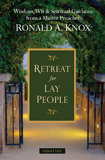 A Retreat for Lay People
A Retreat for Lay People
Spiritual Guidance for Christian Living
Fr. Ronald Knox
A Retreat for Lay People brings together a collection of Fr. Ronald Knox's conferences preached over a period of fifteen years. His opening topic is "Discouragement in Retreat," and he concludes with a reflection on "Our Lady's Serenity." In between, Knox addresses the big questions - the fear of death, the problem of suffering, the world to come - but he also explores the little questions that loom large in our daily lives, like minor trials, liberty of spirit in prayer, and the use of God's creatures.
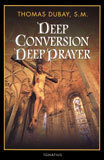 Deep Conversion/Deep Prayer
Deep Conversion/Deep Prayer
Fr. Thomas Dubay, S.M.
Fr. Thomas Dubay is one of the most popular and respected retreat masters and spiritual directors in the USA. He is the author of the perennial best-selling book on prayer and contemplation, Fire Within. In this book, he responds to the call to priests by both Pope John Paul II and Benedict XVI to help believers and all those interested in spirituality to develop a deeper prayer life and union with God.
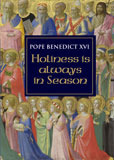 Holiness is Always in Season
Holiness is Always in Season
Pope Benedict XVI
This inspiring volume presents the Pope's numerous reflections on many saints arranged according to the calendar year. He shows how the life of each saint has something unique to teach us about virtue, faith, courage and love of Christ. Dozens of saints are covered in this wonderful spiritual book. The Pope exhorts us through their lives, "Be holy! Be saints!"
Arise from Darkness
What to Do When Life Doesn't Make Sense
Fr. Benedict J. Groeschel
Well-known author, psychologist and priest Fr. Benedict Groeschel draws on his own years of personal experiences in dealing with people's problems, tragedies and "darkness" as he offers help and guidance for any Christian troubled or burdened by life. If you are struggling with fear, anxiety, grief, loss of loved ones, hurt, anger or anything that makes life difficult or the road through it dark, then this book was written for you. Fr. Benedict offers practical suggestions on how to keep going and even grow with the help of God's grace, even when this help seems remote.
Father Peyton's Rosary Prayer Book
Fr. Patrick Peyton
The most complete prayer book of meditations on the mysteries of the Rosary today. He gives 230 meditations on the twenty mysteries of the Rosary, with each set of five meditations having its own theme. Includes the new "Luminous Mysteries, the Rosary prayers", and many full-color illustrations.
Fire Within
Teresa of Avila, John of the Cross and the Gospel on Prayer
Fr. Thomas Dubay, S.M.
This book is the fruit of Fr. Dubay's many years of study and experience in spiritual direction and in it he synthesizes the teachings on prayer of the two great doctors of the Church on prayer--St. John of the Cross and St. Teresa of Avila--and the teaching of Sacred Scripture.
Five Pillars of the Spiritual Life
A Practical Guide to Prayer for Active People
Fr. Robert Spitzer, SJ
Fr. Spitzer presents a practical, yet rich guide for helping busy people develop a regular and deeper prayer life. This brilliant Jesuit priest presents five essential means through which the contemplative and active aspects of our lives can be fused together for a stronger spiritual life.
He Leadeth Me
Fr. Walter Ciszek, S.J.
He Leadeth Me is the deeply moving personal story of one man's spiritual odyssey and the unflagging faith which enabled him to survive the horrendous ordeal that wrenched his body and spirit to near collapse.
Into Your Hands, Father
Abandoning Ourselves to the God Who Loves Us
Fr. Wilfrid Stinissen
In this simple but profound book, Father Stinissen distinguishes three degrees or stages in abandonment. The first stage consists of accepting and assenting to God's will as it manifests itself in all circumstances of life. The second is actively doing God's will at every moment of one's life. In the third stage, abandonment to God is so complete that one has become a tool in God's hands. At this stage it is no longer I who do God's will, but God who accomplishes his will through me.
Prayer Primer
Igniting A Fire Within
Fr. Thomas Dubay, S.M.
Addressing many questions about how to pray well, Father Dubay combines depth and readability, intelligence and practical guidance in a way that will draw readers naturally into conversation with the One who loves them most of all.
Jesus, Teach Us To Pray
Jerome Bertram
In this book Fr. Jerome Bertram answers the plea of so many of his contemporaries. Drawing on his own experience and his vast knowledge of trusted spiritual authors, he leads his readers into the various ways of prayer.
7 Secrets of the Eucharist
Vinny Flynn
Pope John Paul II referred to the Holy Eucharist as "the greatest treasure of the Church," and yet even many devoted Catholics have a very limited understanding of this powerful sacrament. This book will change all that.
Prayer For Beginners
Peter Kreeft
Peter Kreeft brings his unique insights to this most important area of our spiritual lives. He claims he himself is still a beginner in prayer, and this book is for all those, like him, who feel that they are not good at praying but desire to become much better at it.
Jesus of Nazareth
From the Baptism in the Jordan to the Transfiguration
Pope Benedict XVI
In this bold, momentous work, Joseph Ratzinger—in his first book written since he became Pope—seeks to salvage the person of Jesus from recent "popular" depictions and to restore Jesus' true identity as discovered in the Gospels.
To Know Christ Jesus
Frank Sheed
This modern spiritual classic by Frank Sheed, the renowned author, publisher and lecturer, is brought back into print for the benefit of new generations of readers to develop a deeper, more profound knowledge of Jesus Christ.
Transformation in Christ
On the Christian Attitude
Dietrich von Hildebrand
Recognized as a modern spiritual classic and perhaps Dietrich von Hildebrand's greatest work, this sublime and practical study gives a penetrating analysis of the true path to holiness for those who love Christ.
The Rosary: Chain of Hope
Fr. Benedict J. Groeschel
Responding to the Pope's Apostolic Letter on the Rosary, his five new "Luminous Mysteries", and declaration of 2003 as "The Year of the Rosary", Fr. Groeschel presents this book of meditations on all 20 mysteries of the rosary.
Spiritual Direction of Saint Claude De Colombiere
Mother M. Philips
St. Claude la Colombiere, recently canonized by Pope John Paul II, ranks among the masters of the spiritual life as a director of souls.
DVDs
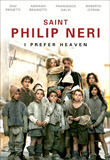 Saint Philip Neri
Saint Philip Neri
I Prefer Heaven
An epic feature film on the famous "Apostle of Rome" and great friend of youth in the 16th century. One of the most popular saints of all time, St. Philip Neri was widely known for his great charity, deep prayer life, and tremendous humor. This captivating film highlights Neri's great love for youth, his warm sense of humor, contagious joy, deep mystical spirituality, and his amazing gift for miracles.
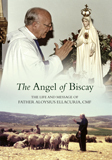 The Angel of Biscay
The Angel of Biscay
The Life and Message of Fr. Aloysius Ellacuria CMF
In a time of world upheaval God raised up an extraordinary priest in Fr. Aloysius Ellacuria, CMF. (1905 - 1981) So completely did he sacrifice his will in the service of God and neighbor that blessings were showered upon him in abundance, and upon those whose lives he touched. His sanctity was confirmed by miracles and countless conversions. But, suffering also became his constant companion, and many dark nights he meekly endured. This new documentary film tells the story of the famous "Fatima priest", and traces his fascinating life journey from his Basque home in Northern Spain to the United States, Mexico and Portugal and back to the USA. It interviews many people who worked closely with him, and others whose lives he deeply impacted.
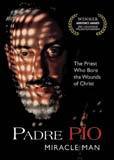 Padre Pio
Padre Pio
Miracle Man
This movie captures the Capuchin friar's intense faith and devotion, and deep spiritual concern for others, as well as his great compassion for the sick and suffering. It reveals the amazing details and events in Padre Pio's life as a boy and throughout his 50 years as a friar, dramatizing the frequent attacks of the Devil on him, as well as the persecution he suffered at the hands of people, including those in the church.
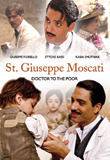 St. Giuseppe Moscati
St. Giuseppe Moscati
Doctor to the Poor
Giuseppe Moscati, "the holy physician of Naples," was a medical doctor and layman in the early 20th century who came from an aristocratic family and devoted his medical career to serving the poor. He was also a medical school professor and a pioneer in the field of biochemistry whose research led to the discovery of insulin as a cure for diabetes.
Saint John Baptist de la Salle
Patron Saint of Teachers
The inspiring story of a 17th century French priest who reluctantly became involved in educating poor children and in the process became the Founder of the Brothers of the Christian Schools, an order known today as the De La Salle Christian Brothers. Actor Mel Ferrer gives a heartfelt performance as St. John Baptist de La Salle, a priest from a wealthy upper-class family who gave up everything to serve the needs of educating poor children, facing tremendous opposition along the way.
The Miracle of Father Kapaun
In this powerful documentary, learn Fr. Kapaun's inspiring life story, his heroic work as a chaplain during battle, and his leadership and comfort of fellow American prisoners after capture and torture by the Communists. This imprisonment under incredibly harsh conditions ultimately led to his death at 35 years of age in 1951.
Bernadette
150th Anniversary Edition
From Jean Delannoy, one of France's foremost filmmakers, comes this top quality feature film production of the story of St. Bernadette and the apparitions of Our Lady of Lourdes. Actress Sydney Penny gives a beautiful performance as Bernadette, and the rest of the cast is equally superb.
Spiritual Exercises of St. Ignatius
From his experiences in solitary prayer, St. Ignatius wrote a handbook for retreats called The Spiritual Exercises. These "exercises for the soul" lead the follower of Christ from self will and excessive attachment into the freedom of the sons of God: freedom to know and do the will of God. Under the guidance of Fr. Raymond Gawronski, S.J., the viewers of this 13 part series can make the actual Ignatian retreat, covering all the major points of the Spiritual Exercises.
Gifts From God
The Papacy and Confession
This new DVD has two excellent documentary films, one on the papacy titled Keys of the Kingdom: Understanding the Papacy, and the other titled Confession: The Forgotten Sacrament. Both films feature expert priests and theologians presenting in-depth commentary on these two sublime spiritual gifts from God to humanity through the Church, revealing the powerful spiritual significance of the papacy and confession for Catholics.
Finding Fatima
Produced by the award-winning filmmakers of the highly acclaimed feature film The 13th Day, this is a powerful and in-depth documentary that combines archival footage, dramatic reenactments, original interviews with Fatima experts and stunning visuals to tell the whole story of the apparitions of Our Lady of Fatima.
No Greater Love
A Unique Portrait of the Carmelite Nuns
A highly acclaimed, multiple award-winning documentary, No Greater Love follows in the wake of the great success of a similar film, Into Great Silence, as it gives a unique insight into this closed world of these nuns where the modern world's materialism is rejected; they have no television, radio or newspapers. The film interweaves a year in the life of the monastery with the daily rhythms of Divine Office and work.
For Additional Sale Items Click HERE!
Items are not sold on approval.
Periodically we make available -- only to you, our valued repeat customers -- special offers which are not available to the general public. We offer these discounted prices as our gift to those who help us by using Ignatius.com. Please do not ask for retroactive price consideration. We cannot accommodate those requests. Many thanks.
December 20, 2011
Impressed by Catholic Logos Bible Software 4
For nearly twenty years, Logos Bible Software—which was founded in 1992 in western Washington—has been recognized for producing exceptional Bible software. From humble beginnings in (where else?) a basement, the company now partners, its site states, "with more than 130 publishers to make more than 15,500 electronic Bible study resources available to customers around the world." The company's technology "is used in more than 180 countries in a dozen languages."
In recent years there were increased rumors that Logos, which was founded by and oriented toward Evangelical Protestants, was working on a Catholic version of Bible software. And, sure enough, 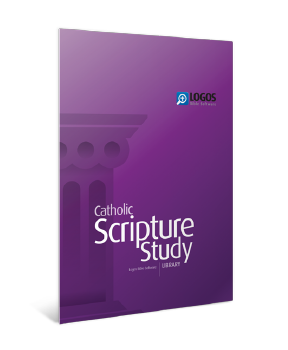 Catholic Logos Bible Software 4 was released a few months ago, the result of Logos being committed to producing a Bible software that is truly Catholic (and not just Protestant + some Catholic add-ons) and the hard work of Andrew Jones, who took on the task of being the Catholic Product Manager at Logos in June 2011. Andrew is an ecclesiastical historian of the Middle Ages by training. Of his work with Logos, he states: "As the Catholic Products Manager at Logos Bible Software, my ambition is to promote the use of Logos software as a remarkable tool for integrating all aspects of the rich Christian tradition with contemporary thought and with the needs of the living Church."
Catholic Logos Bible Software 4 was released a few months ago, the result of Logos being committed to producing a Bible software that is truly Catholic (and not just Protestant + some Catholic add-ons) and the hard work of Andrew Jones, who took on the task of being the Catholic Product Manager at Logos in June 2011. Andrew is an ecclesiastical historian of the Middle Ages by training. Of his work with Logos, he states: "As the Catholic Products Manager at Logos Bible Software, my ambition is to promote the use of Logos software as a remarkable tool for integrating all aspects of the rich Christian tradition with contemporary thought and with the needs of the living Church."
And Logos is, I think, a most remarkable tool, in terms of quality, flexibility, and quantity, by which I mean the dizzying array of hundreds of resources available: translations of the Bible, interlinear Bibles, commentaries, reference works, studies, maps and media, sermons (most notably by Newman), spiritual classics, works of theology and Church history, lectionaries, ancient texts and original languages, lexicons, and more. A recent review in National Catholic Register gives an excellent overview of the depth and breadth of resources offered:
In order to explore this living tradition, Logos has assembled a package with a healthy selection of Church fathers and doctors, council documents, devotional works and theological works. At its heart are multiple English language translations, led by the Revised Standard Version Catholic Edition, the New American Bible and the Douay-Rheims, and supplemented by the King James Bible and other non-Catholic translations. The Biblia Sacra Vulga and Clementine Vulgate are included, as well as numerous English-Greek and English-Hebrew reverse interlinear versions, synopses, parallel Gospels and harmonies.
The first layer of critical material is a selection of commentaries by Father John MacEvilly, Father George Haydock, Father Raymond Brown and Bishop Frederick Justus Knecht, as well as the Catena Aurea of St. Thomas Aquinas and the Venerable Bede's commentary on Revelation. The second layer of critical material is comprised of the complete Ante-Nicene, Nicene and Post-Nicene fathers, along with the Summa Contra Gentiles and Summa Theologiae (Latin and English, with the option to switch instantly between each), most of the writings of Blessed John Henry Newman, and a good selection of documents of Church councils.
There are also dozens of Catholic theological and historical works, including all four volumes of Father John Meier's A Marginal Jew, along with works by Joseph Pohle, G.K. Chesterton, Ludwig Ott and others. Dozens of works by and about the saints are included: Sts. Augustine, Thérèse of Lisieux, John of the Cross, Bernard, Teresa of Avila, Francis, Ignatius and others. Almost all of the major devotional works, as well as the complete Butler's Lives of the Saints, are here.
The software is available in three different base packages: Catholic Foundations, Catholic Scripture Study, and Catholic Scholar's Library; here is a helpful comparison chart. The software does take some time and effort to get used to, but that is largely because it there is so much flexibility and adaptability available to the user. Pages and windows and information can be arranged, accessed, and ordered in a multitude of ways. Libraries and specific studies can be customized with precision. Searches produce an impressively arranged set of results that can be further focused and filtered. For example, a search for the word "apocalypse" brings up 2,022 results in 1,011 articles in 142 resources; those can then be furthered refined. A search for "justification" in "all Bibles" results in 128 results in 120 verses in 24 resources, with every sort of detail (or links to more detail) about the original language, context, usage, etc. I am especially taken with how easy it is to access the original Hebrew or Greek from a specific passage and verse, and then further dive into studies of particular words and how they used in other passages, and so forth.
In the Register review, Jones makes this most interesting comment about the approach taken by the Logos software, and how it fits with an integrated Catholic approach to studying and contemplating Scripture and Tradition:
This conception requires a unique approach to the Bible — an approach that I think has been hindered by the technology of printed books, because print has required that each work be essentially isolated from all others, physically and conceptually. The digital age is changing this. Logos is extremely flexible and adaptable to many styles of Bible study, but it is especially well suited to the Catholic approach, because it allows the biblical text to be studied literally surrounded with the Tradition — really in constant dialogue with the tradition.
As someone who is very loyal to the printed page (and who still buys so many physical books that my wife prays daily that I'm healed of the compulsion), I can see and readily acknowledge his point. Thankfully, it's not an either/or proposition. But the fact is, the Logos software provides an immediacy and range that really cannot be duplicated with a physical library (unless, of course, you are a freakishly gifted person, like St. Thomas Aquinas). And when you consider that Logos can be accessed on multiple computers and smart phones, it's hard to deny the tremendous benefits of such software.
Finally, I'm happy to note that in January 2012, the Joseph Ratzinger/Pope Benedict XVI Collection (14 vols.) will be available for purchase from Logos. This collection is the result of a licensing agreement with Ignatius Press and contains many of Ratzinger's most essential writings, including Introduction to Christianity (2nd edition), The Spirit of the Liturgy, and more, as well as Benedict XVI's second Jesus of Nazareth book. And in development is a 34-volume set of encyclicals of Bl. John Paul II and Pope Benedict XVI, which will include both the Latin and English texts of those essential papal works.
Other reviews of Catholic Logos Bible Software 4:
• Bible Software for Catholics | First Things
• Scripture 4.0 | National Catholic Register
• Logos: The Best Catholic Bible App (with interview with Andrew Jones) | Taylor Marshall
• 7 Ways the Logos Catholic Software Will Revolutionize Your Faith | Brandon Vogt
• Logos 4 and Catholic Scripture Study | Jeff Miller (The Curt Jester)
• Bible Study & Evangelization in the 21st Century | Dr. Michael Barber (The Sacred Page blog)
Schall's Syllabus
Fr. James V. Schall, S.J., has put together some more book lists in this article for CrisisMagazine.com. I say "more book lists" because Fr. Schall has put together many fine book lists over the years, perhaps most notably in his outstanding book, Another Sort of Learning. Anyhow, his new article includes a list of "five very good books that any college student should start with", as well as lists of books by Chesterton, "five books of initial insight", "five books on the philosophical basics", five books by the great Thomist, Josef Pieper, and five books by Schall himself. Many of these books, I'm happy to say, are published by Ignatius Press, notably works by Chesterton, Pieper, Thomas Howard, Peter Kreeft, and Schall himself.
Fr. Delp and Advent: "This is seed-time, not harvest."
Since being published by Ignatius Press in 2006, Fr. Alfred Delp's Advent of the Heart: Seasonal Sermons and Prison Writings - 1941-1944 (originally published, in part, in German in 1984/1985), has been increasingly recognized as a unique and deeply challenging book about Advent. In a December 11, 2011, editorial for Our Sunday Visitor newspaper, John Norton wrote about the book:
I stumbled across it recently and found it exceptionally moving.
Granted, this was written by a man who probably had a pretty good idea that his trial was to be a sham legal process and the Nazis 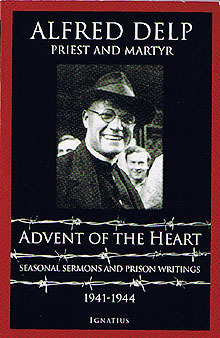 would end up executing him. So there's an intensity there that we, in relative peacetime abundance, understandably have difficulty mustering.
would end up executing him. So there's an intensity there that we, in relative peacetime abundance, understandably have difficulty mustering.
But there is also a warning he offers, and paid for with his life: If we cling to false securities and believe in our own power, eventually our world will be rocked and descend into chaos and darkness.
"There is perhaps nothing we modern people need more than to be genuinely shaken up," he said, so that we reestablish God, and not ourselves, at the center of our lives. ...
God forbid that any of us ever finds ourselves in the situation that Father Delp did. We ought to take advantage of the clarity of vision his situation gave him.
"The great question to us," he writes, "is whether we are still capable of being truly shocked or whether it is to remain so that we see thousands of things and know that they should not be and must not be, and that we get hardened to them. How many things have we become used to in the course of the years, of the weeks and months, so that we stand unshocked, unstirred, inwardly unmoved.
"Advent is a time when we ought to be shaken and brought to a realization of ourselves. ... Being shattered, being awakened — only with these is life made capable of Advent. In the bitterness of awakening, in the helplessness of 'coming to,' in the wretchedness of realizing our limitations, the golden threads that pass between heaven and earth in these times reach us. These golden threads give the world a taste of the abundance it can have."
I've come across many other references to the book. In a recent post on his "Bangor to Bobbio" blog, Fr. Seán Coyle (Bacolod City, Negros Occidental, Philippines), wrote of the inspiring witness of Fr. Delp and quotes from a 2008 essay, "Advent — A Season to Find Hope Amid Despair In The World", by Joseph F. Pisani:
[Fr. Delp] often reflected on the need for courage in a world that had forgotten the meaning of Christmas. Isn't the same true today? Almost 65 years later, atrocities are still being committed, and hearts grow cold in the relentless pursuit of power, profit and possessions. We live in an age characterized by greed and gross insensitivity to suffering.
Delp was one of those principled men and women who appear in every generation and confront the insanity of a world dark with despair, illuminating the way for the rest of us. His example ignited the ideals of his fellow prisoners, who, by any reckoning, had no reason to be hopeful. The source of his strength was a realization that the child in the manger was greater than all the tyrants and totalitarian regimes in history.
In his last meditation, composed on Christmas Eve, a month before he would be hanged for treason, Delp wrote, "How many types of people today could honestly appear at the manger? Most of them have absolutely no desire to do so. The small, scanty door does not let anyone riding a high horse get through. ... How much of what we are living through today cannot stand in the presence of the Child!"
Even though the Nazis pressured him to leave the Jesuits, he resisted, and professed his final vows shortly before his execution on February 2, 1945. Facing death, he was in good spirits and joked with his confessor that, "In half an hour, I'll know more than you do."
Fr. Coyle also refers to a lengthy paper, "Advent of the Heart: The Prison Meditations of Alfred Delp, SJ" (available online as a PDF file), written in 2010 by Jenny Howell, a Ph.D. candidate in Theology at Baylor University in Waco, Texas. Howell writes:
He wonders: can joy be found here on earth? Of course! Joy can be experienced in the blooming of flowers, in a meeting with a true friend, in the sun, or the movement of water. There are joyful emotions that mean we are capable of truly loving and truly suffering. The earth, as well as heaven, can be a great occasion for joy. "I know perfectly well the many sources from which joy can flow out to man—and that all these sources can also fall silent." That kind of joy is not what Father Delp sought to write about. Rather, "It's about that old theme of my life: man becomes healthy through the order of God and in nearness to God. That is also where he becomes capable of joy and happiness. Establishing the order of God, and announcing God's nearness, and teaching it and bringing it to others: that is what my life means and wants, and what it is sworn to and abides by."
When Father Delp finally received his condemnation to death, he was surprised by his own surprise. Of course the outcome was inevitable, he mused, but how difficult to accept when his very nerves "tingled with life." He did not embrace death passively. "To be quite honest I don't want to die, particularly now that I feel I could do more important work and deliver a new message about values that I have only just discovered and understood. But it has turned out otherwise." One thing was gradually becoming clear: Father Delp knew he must surrender himself completely. "This is seed-time, not harvest. God sows the seed and some time or other he will do the reaping. The only thing I must do is to make sure the seed falls on fertile ground," he writes. "May others at some future time find it possible to have a better and happier life because we died in this hour of trial."
Even in the last bits of writing he was able to smuggle out of his jail cell, Father Delp sustained a hope that transcended his own life. His hope rested on the belief that Christians would still be able to hear the Advent voice crying from the wilderness, "Prepare the way of the Lord!"
Fr. Delp also wrote about Christmas; here is a selection on Ignatius Insight:
Related Articles, Interviews, and Links:
• "All of life is Advent": On the life and death of Alfred Delp, S.J. | Abtei St. Walburg
• The Mystery Made Present To Us | Fr. Alfred Delp, S.J.
• Remembering Father Alfred Delp, S.J., Priest and Martyr | A Conversation with Father Karl Adolf Kreuser, S.J.
• Remembering a Priest and Martyr: On the Ordination Anniversary of Alfred Delp, S.J. | Abtei St. Walburg
• Faithful Even Unto Death: The Witness of Alfred Delp, S.J. | Fr. Albert Münch
• Alfred Delp Society website (German language only)
December 19, 2011
Three by Teresa Tomeo on Advent and Christmas
Teresa Tomeo, author of Extreme Makeover: Women Transformed by Christ, Not Conformed to the Culture, has been writing some columns for Fathers for Good, an initiative for men by the Knights of Columbus.
One is "Reclaiming Advent", which recounts how an accident led to a deeper appreciation of the meaning of Advent. Another is "Shopping with Christmas Values", which begins with these questions:
Advent is supposed to be a time of reflection and penance, yet too often becomes rushed and hectic as the stores count down the number of shopping days till Christmas.
But did you ever think about ways to incorporate the gift buying into a more meaningful experience that could make a statement about who you are and who Christ is? Did you ever think that shopping could be done with a lot of purpose, not only to provide nice gifts but to engage the culture and counteract some of the ugliness and ungodliness so prevalent in today's world?
Her most recent, "No Better Gift", encourages husbands and wives to accept and embrace the gift of praying together:
There are only a few days left until Christmas and you're still stumped on what to give to your husband or wife. Maybe that long-awaited weekend away for just the two of you? Maybe a gift certificate to his or her favorite restaurant? Those are nice ideas but wouldn't it be great if we could give something that would last for more than a few hours or days? How about something that could make a positive and powerful impact on your marriage?
One of the best gifts my husband and I ever gave each other, from which we still benefit greatly, was the gift of couple prayer. Most Catholics are familiar with the saying made famous by the much loved priest Father Patrick Peyton, who founded the Family Rosary Crusade movement: "The family that prays together stays together." Well, Father Peyton was right about family prayer, so it would naturally follow that couple prayer strengthens marriages also. What married couple living in today's increasing secular society couldn't use a little spiritual toning and strengthening?
Is it "alter ego" or "altar ego"?
Both, I think, based on far too many past examples and this story, "Fighting Tradition, A Catholic Womanpriest Leads Mass in East Village", on the WNYC.org site:
This is not a traditional church. In fact, it's just the community room of a residential building in the East Village. Paper signs taped to entrance read "Private: Prayer Service in Session. Do not disturb."
But on the second Sunday of the month, a small group gathers at 175 E. 4th Street to celebrate a Catholic mass, creating a sanctuary by dragging chairs into a circle and setting up a makeshift alter. A woman, Gabriella Velardi-Ward, leads the celebration, which is part of a growing movement worldwide that's changing who can lead a Catholic church.
"I was 5-years old when I told my sister I wanted to be a priest when I grew up," Ward said. "She said 'Ha, you can't you're a girl.' I couldn't put words to it then, but on reflection I realize that rejection formed my life."
Ward was ordained in 2008 as part of a movement called the Roman Catholic Womenpriests. The movement dates back to 2002 when a group of women in Austria and Germany wrote to three bishops seeking ordination.
Two of those bishops -- whose identities are not known to Rome -- conducted the first ordination on a boat aboard the Danube River.
Seven women were ordained and since then the movement has grown to 120 people globally.
To be fair, the piece is accurate about a couple of key points: priestettes are indeed fighting—attacking, really—Tradition, and that is hardly a small point when it is understood that Tradition is not some collection of mere patriarchal talking points, but the depositum fidei, or "sacred deposit" of the faith, handed on to the Church by the apostles, who were entrusted with the same by Jesus Christ; and, secondly, it is indeed a makeshift "alter". It might as well be a makeshift duck-hunting platform or a makeshift piece of post-modern sculpture for all it means when it comes to actually being Catholic.
What is particularly funny about the above piece is the shameless schizophrenia of it all: Womenpriests are against Tradition! They are sticking it to the Church! But they want to be part of the Tradition! They demand to be accepted by the Church! Perhaps they are looping that rousing Queen song during their "mass": "I want it all, I want it all. I want it all. And I want it now!"
I suppose this is "normal" when you have an alter ego based around an ego that demands control over the altar rather than than placing oneself on the altar. It is the same sort of confused emoting that feeds much of the so-called "new atheism", which features a number of people who are intensely angry toward a Being they insist doesn't even exist. It has all been expressed poetically and memorably by comedian Jim Gaffigan, in a routine about meat and vegetarians:
I like meat, I do.
But you know who seems to be really obsessed with meat? Vegetarians.
For people who don't like meat, they seem to eat a lot of vegetables that are mashed up and shaped to look like meat. [In his "vegetarian" voice]: "I find meat repulsive. I'll have a veggie burger with fake bacon, and can you serve it to me dressed like a cow? I don't like meat; I just like to call meat late at night and hang up. Let's drive by meat's house. Does meat ever ask about me? [singing] I don't care! I ain't missin' you at all...missin' youuuuuu...."
You never see that the other way: [meat eater's voice]: "I will have the steak and can you make it taste like tofu?"
So, in the end, we are left with "news" articles about women pretending to be priests while standing around an "alter" that isn't an "altar", written by a reporter who is trying to alter what Catholics believe about service at the alter, while not appreciating the irony of working to destroy what is claimed to be prized most of all. How fitting that one definition of "alter ego" includes this: "A person with an alter ego is said to lead a double life."
Carl E. Olson's Blog
- Carl E. Olson's profile
- 20 followers




